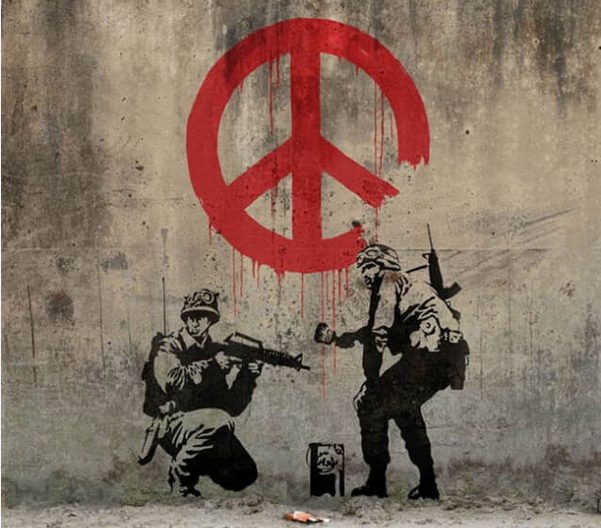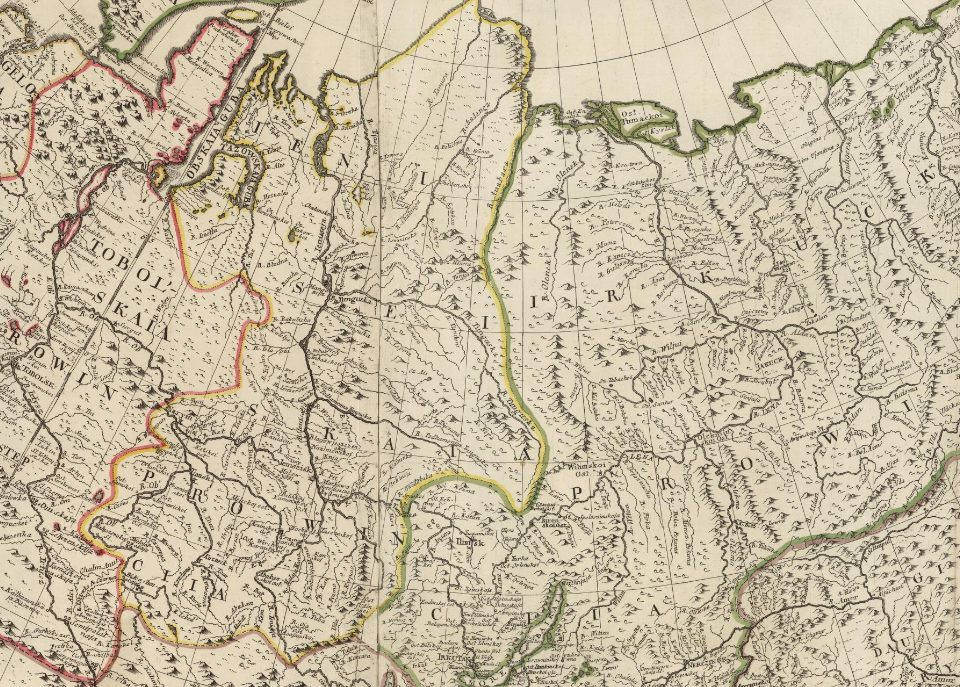


Counterterrorism: How to Fail Most Successfully
16 April 2023
Facing Nuclear Vulnerabilities
16 April 2023By Julie Saada
Since the Russian invasion of Ukraine on February 24, 2022, many abuses have been committed according to an independent United Nations commission(1)The Independent International Commission of Inquiry on Ukraine presented its findings on events during late February and March 2022 in the Kyiv, Chernihiv, Kharkiv and Sumy regions on 18 October 2022. Findings about events during late February and March 2022 in the four regions of Kyiv, Chernihiv, Kharkiv, and Sumy, Independent International Commission of Inquiry on Ukraine – Note by the Secretary-General (A/77/533).: murders, arbitrary detentions and enforced disappearances, torture and mistreatment, and sexual violence. Ongoing since the start of the conflict in different areas, the search for evidence aims to establish the truth about the acts committed in anticipation of initiating criminal proceedings. These searches come from a demand for truth and justice both by certain governments as well as by civil society, including NGOs and legal actors. They also provide opportunity to reaffirm the prohibition of resorting to the use of force as well as the international criminal liability of perpetrators of war crimes, crimes of aggression, crimes against humanity, and genocide – all of which fall under the jurisdiction of the International Criminal Court created by the Rome Statute in 1998 and first called to order in 2002.
An Established Right
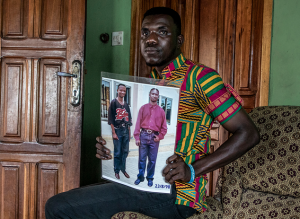
The decision of the UN is a sign of hope for all those who are without news of relatives disappeared under Jammeh in Gambia. © Jason Florio / TRIAL International
The quest for truth in the context of serious human rights violations and its expression as part of a demand for justice constitute major issues during and after conflicts. International law even defines a ‘right to the truth’, codified in article 24(2) of the International Convention for the Protection of All Persons from Enforced Disappearance, which came into effect in 2010. It states, ‘the right to know the truth regarding the circumstances of the enforced disappearances, the progress and results of the investigation and the fate of the disappeared person’ and requires states to take steps to implement it. While it has already been established that enforced disappearances have taken place in Ukraine, the demands for truth go much further to encompass the entirety of the crimes committed, while at the same time satisfying demands for justice in any criminal proceedings that may be initiated during or after the conflict.
Truth Versus Justice?
In the forms of justice adopted coming out of conflicts, recourse to criminal justice is far from the most frequent form of justice, and the quest for truth can get separated from, or pitted against, the quest for justice. Thus, some supporters of the right to the truth initially defined it as a component of the right to know that can oblige a state to open an investigation, distinguishing it from the right to justice, which implies establishing liability by criminal prosecution rather than solely by the results of investigations. The quest for truth has also been opposed to the quest for criminal justice because the latter would not achieve the sought-after objectives of post-conflict contexts: trials focus on the past whereas what matters in political transitions is the future; trials hinder peace processes (some parties to the conflict might have an interest in continuing the conflict to avoid prosecution); they polarise populations by simplistically categorising criminals and victims; or they apply a victor’s justice that excludes certain groups from post-conflict society.
Trials are also criticised for obstructing public awareness of the truth. Perpetrators would have an interest in hiding the truth given the risk of sanctions, while the limited space accorded to the victims would prevent the examination of significant elements. More generally, the resulting truth would be a legal one as opposed to a historical one. In court, the truth would be determined by criminal law and procedure. Trials only shed light on one aspect of crimes: the principle of individualisation of criminal responsibility falls short of grasping the chains of military, administrative, and political command, the indirect participation of other actors, and the broader social structures fostering the crimes. However, the specificity of mass crimes lies in their inextricability from these broader structures, as established by Raphaël Lemkin, who coined the concept of genocide in 1944.
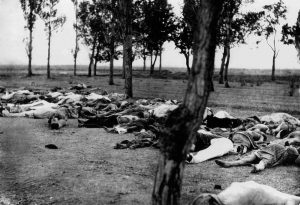
Armenians killed during the Armenian Genocide. Massacre, starvation, and exhaustion destroyed the larger part of the Armenian refugees in 1915. Turkish policy was that of extermination under the guise. © 2003-2023 Shutterstock,
In his earliest work on the Armenian genocide, Raphaël Lemkin demonstrated that extermination marks the end of a process that began much earlier, such that genocide can only be fully grasped by analysing the social contexts on a broad scale, well beyond the criminal categories that individualise guilt and require direct evidence. Consequently, even if criminal investigations produce a wealth of contextual information and some trials have tapped historians as expert witnesses, criminal justice might paradoxically limit access to knowledge of social processes that lead to the awareness of historical truth and of the production of a collective narrative developed in the post-conflict period.
The rise of truth and reconciliation commissions since the 1980s has sought to resolve some of these difficulties by enabling knowledge of the truth about the crimes committed (such as the South African commission, where amnesty could be granted in exchange for a full confession), the accomplices, the circumstances of the crimes or even the location of the bodies – as was the case in Argentina with the ‘Truth Trials’ (without criminal proceedings). These commissions also promote the right to know as well as to mourn the victims. Moreover, they better respond to public demand for truth after a period of extreme violence, repression, and secrecy – especially in the case of dictatorships – all while allowing for a plurality of narratives that, when told in public, can be pacifying and socially inclusive. In sum, narrative truth can foster the reconstruction of social ties by recognising the diversity of narratives in the public space as well as the production of a collective memory.
Such are the benefits of these solutions, sometimes as alternatives to, sometimes complementary to, criminal proceedings, which come down to separating the right to truth from the right to justice in the name of a transition to the rule of law and democracy.
Truth and Justice: Towards an Interdependence of Rights
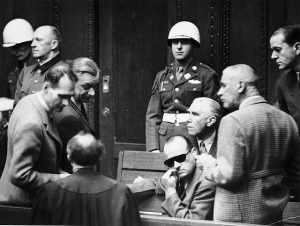
The accused speak to each other and to their lawyer during a break at the International Military Tribunal in Nuremberg. Wikimedia Commons.1946. Public domain
This vision of the right to truth, understood in a limited legal sense or as a broader moral right, rests nevertheless on debatable assumptions. Trials do not aim to produce a public narrative based on consensus with inclusiveness based on the equal consideration of agents whether they are victims, perpetrators, or accomplices. And such a narrative does not necessarily restore the sought-after social trust beyond the end of the violence when the crimes committed have deeply fractured societies. Finally, how to reconcile the promotion of a single, consensus-based narrative if postmodern democracies – to use Mark Osiel’s phrase(2)Mark Osiel, Mass Atrocity, Collective Memory, and the Law, New Jersey:Transaction Book, 1997. — are characterised by pluralism and an economy of moral disagreement?
Of course, separating the right to truth from the right to justice is sometimes the only politically feasible solution. In some contexts, satisfying the right to truth facilitates subsequent criminal prosecution by documenting crimes, as was the case in Argentina. But it remains difficult to separate these two rights considering their objectives. The right to truth influences the realisation of other human rights by requiring states to investigate crimes, thus underscoring the interdependence of these rights. Moreover, it is difficult to justify impunity – that is, the denial of rights – with the aim of establishing the rule of law that confers equal rights on individuals and refuses to prioritise fundamental rights. No narrative can be inclusive and, therefore, democratic, if it is built on the denial of victims’ rights, since the principle of equality before the law also implies the protection of individuals by the law. Implementing an unequal process (by denying the rights of victims in the name of constructing a consensus-based and inclusive narrative) cannot promote equal rights. On the contrary, recognising the dignity of human beings implies the right not to disappear in secrecy (in the case of enforced disappearances) and requires the criminal punishment of fundamental rights violations.
In the 2000s, the right to truth became a tool for invalidating amnesty laws when they were found to impede investigations and the identification of those responsible for human rights violations, their punishment, and the adoption of reparation measures. The right to truth then became a component of the right to justice and its scope went beyond the case of enforced disappearances to include all mass human rights violations, including extrajudicial killings and torture.
In addition, we can introduce two additional arguments from different ethical schools. From a deontological point of view, the idea that ‘justice must be done’ implies that the perpetrator of a crime must be punished, regardless of the social effects, simply because the criminal act is intrinsically evil. And respect for fundamental rights, such as the right to a fair trial and the punishment of perpetrators of the most serious crimes, is all the more necessary when our deepest moral values have been attacked, as Michael Walzer points out(3)Michael Walzer, Just and Unjust Wars: A Moral Argument with Historical Illustrations, New York: Basic Books, 2000, p. 289..
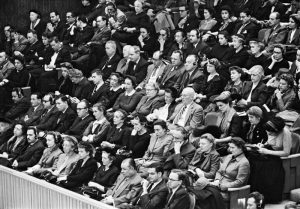
View of the defendants in the dock at the International Military Tribunal trial of war criminals in Nuremberg.1946. Pyright. Source : the United States Holocaust Memorial Museum. Copyright
public domain
From a consequentialist point of view, it is not only useful for international crimes to be punished by international law (which, without punishment, would only be morality, as John Austin and Max Weber argued(4)John Austin, The Province of Jurisprudence Determined (1832), ed. W. E. Rumble, Cambridge: Cambridge University Press, 1995, p. 18-29 ; Max Weber, Économie et société, t. II : L’organisation et les puissances de la société dans leur rapport avec l’économie (1922), trad. J. Freund, P. Kamnitzer, P. Bertrand, J. Chavy, E. de Dampierre et J. Maillard, Paris, Pocket, 1995, p. 19.), but it is also necessary for a new political regime to condemn the abuses committed by the old one in order to distinguish itself, if it intends to promote the rule of law. For trials are not only about examining past acts. They promote, both for the present and for the future, rules of law, or a regime based on the protection of rights, if not democratic then at least decent – as defined by John Rawls(5)John Rawls, The Law of People, Cambridge , Cambridge University Press, 1999, pp. 62-78.. As soon as individual responsibilities are assigned, as the Nuremberg judgment established, trials also make it possible to channel the desire for vengeance that would arise from the idea of the responsibility of an entire group.
The objective of peace in contexts where mass crimes have taken place therefore cannot dissociate the right to the truth, understood in both its narrow and broad senses, from the right to justice. These rights express what the jurist Ruti Teitel called the ‘right to accountability’(6)Ruti Teitel, “Transitional Justice and Judicial Activism. A Right to Accountability?”, Cornell International Law Journal, 2015, 385-422. in contexts where accountability was denied by governments, and it refers to the state’s obligation to investigate and prosecute those responsible for the crimes, to judge them, and to provide reparations(7)Melanie Klinkner, Howard Davis, The Right to truth in International Law. Victim’s Rights in Human Rights and International Criminal Law, New York: Routledge, 2020, 49-52.. This right to demand accountability is not defined as such in international law, but it enables thinking about the necessary link between the right to the truth and the right to justice, as well as obligations towards the victims and more broadly towards the societies affected by the crimes . It is the least we can demand for Ukraine.
Julie Saada is a university professor of philosophy at the Law School. Her research focuses on the legal and ethical norms of war and post-war contexts, international criminal justice, and transitional justice. She also leads research in political philosophy and critical theories of law from the perspective of a political philosophy of law.
Notes
| ↑1 | The Independent International Commission of Inquiry on Ukraine presented its findings on events during late February and March 2022 in the Kyiv, Chernihiv, Kharkiv and Sumy regions on 18 October 2022. Findings about events during late February and March 2022 in the four regions of Kyiv, Chernihiv, Kharkiv, and Sumy, Independent International Commission of Inquiry on Ukraine – Note by the Secretary-General (A/77/533). |
|---|---|
| ↑2 | Mark Osiel, Mass Atrocity, Collective Memory, and the Law, New Jersey:Transaction Book, 1997. |
| ↑3 | Michael Walzer, Just and Unjust Wars: A Moral Argument with Historical Illustrations, New York: Basic Books, 2000, p. 289. |
| ↑4 | John Austin, The Province of Jurisprudence Determined (1832), ed. W. E. Rumble, Cambridge: Cambridge University Press, 1995, p. 18-29 ; Max Weber, Économie et société, t. II : L’organisation et les puissances de la société dans leur rapport avec l’économie (1922), trad. J. Freund, P. Kamnitzer, P. Bertrand, J. Chavy, E. de Dampierre et J. Maillard, Paris, Pocket, 1995, p. 19. |
| ↑5 | John Rawls, The Law of People, Cambridge , Cambridge University Press, 1999, pp. 62-78. |
| ↑6 | Ruti Teitel, “Transitional Justice and Judicial Activism. A Right to Accountability?”, Cornell International Law Journal, 2015, 385-422. |
| ↑7 | Melanie Klinkner, Howard Davis, The Right to truth in International Law. Victim’s Rights in Human Rights and International Criminal Law, New York: Routledge, 2020, 49-52. |

